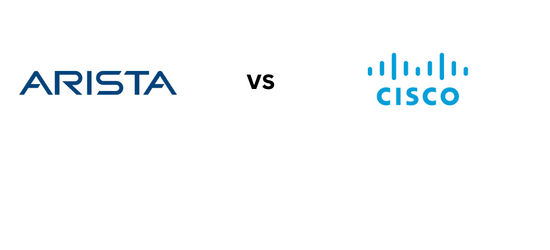Arista and Cisco are one of the best brands in the networking industry, but the Arista vs Cisco comparison is a debate that continues to interest many businesses and tech enthusiasts. If you’re in the market for new tech, it’s critical to weigh your options. While Arista and Cisco are two of the leading names in hardware, it’s important to understand their differences. To help you decide, we’ve created this comprehensive guide on the difference between Arista and Cisco. Before diving into product details, let’s gain some perspective on the companies and what they have to offer.
Arista vs Cisco: Major Players In The Networking Industry
The networking industry has long been dominated by two major players: Arista and Cisco. Both companies specialize in producing switches and routers, some of the most integral components of any network infrastructure. They are also both known for their reliable security products, and both provide a range of services to ensure the optimal performance of their products.
In recent years, Arista has made considerable gains in terms of market share, largely due to its reputation as an innovative player within the industry. Its top-of-the-line technology and support capabilities have made it a preferred choice for many businesses; however, Cisco remains the industry leader when it comes to sheer market presence. Ultimately, both companies offer different ways of approaching network solutions, cater to different types of customer needs, and call upon their respective strengths to stay ahead in this fiercely competitive market.
Arista vs Cisco: Cost Comparisons
Making sure to choose the best network solution for a business or organization is vital for smooth technological operations. Despite Cisco holding the major share of market value, Arista Networks Platform is known to be equal in performance results, making it a viable option. However, it’s important to consider cost when assessing the respective solutions. It is often that Arista products are compared to be more expensive when measured against Cisco options.
Furthermore, when it comes to network service contracts and maintenance packages, Arista tends to have lower overall costs than its counterpart. This gives users additional room to purchase other components or services when setting up their networks.
Cisco Networking Equipment
Cisco networking equipment is essential to many households and businesses today, enabling people to connect to the internet securely and quickly. Cisco networking equipment offers immense flexibility and reliability.
Hubs provide a simple yet economical way to connect multiple computers into the same domain.
Bridges allow for the segmentation of large networks while layer 2 switches offer increased speed and performance over traditional hubs.
Multi-layer switches provide ultimate performance and reliability while routers are essential in connecting two networks.
Modems can convert digital signals into analog signals, allowing communication between the network, the ISP, and other external devices.
A repeater can boost signal strength for long-distance transmissions, making it perfect for large networks that span across entire campuses or cities.
Firewalls can be used to secure a private network from potential cybersecurity threats from public networks or the internet itself.
Arista Networking Equipment
Arista networking equipment is a leader in modern networking technology, offering a wide range of top-tier products and services to help businesses optimize their networks.
Arista’s switches and routers feature cutting-edge hardware, robust software, and the Smart System Upgrade technology – allowing customers to upgrade quickly and efficiently without disrupting any existing infrastructure.
They also provide Network Analytics Technology for troubleshooting errors and attacks, as well as an AI-enabled Optimization Engine to ensure optimal performance.
Arista vs Cisco: Use Cases
Of the two networking giants, Cisco and Arista, it can be difficult to decide which one is best for your organization. But by examining their respective use cases in detail, it becomes easier to identify the advantages of each brand. Arista is often chosen for organizations that demand high-bandwidth, low-latency applications such as interconnecting cloud architectures, internet exchanges, and automatic trading networks.
Meanwhile, Cisco is used largely by customers with a large number of network nodes — offices, branch locations, etc — as it is equipped with comprehensive tools for managing edge devices quickly and reliably. At its core, each brand excels in different areas so understanding these strengths can help companies decide which provider to use for their networking needs.
Arista vs Juniper: Which Is Right For You?
When it comes to networking, you need the right solution for your unique needs. Arista and Juniper are both excellent options, but it’s important to decide which one is best for you. Arista offers efficient data center performance and accurate troubleshooting tools, making it a good choice for medium to large businesses.
Juniper, on the other hand, provides customizable network solutions and comprehensive support from its dedicated customer service team, making it a great choice for enterprise-level organizations that need high levels of customization in their systems. Regardless of which option you choose, rest assured knowing that both Arista and Juniper have proven track records of delivering reliable networking solutions that can handle any business’s networking needs.



